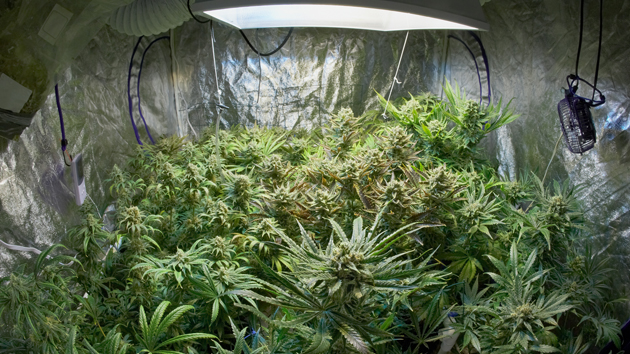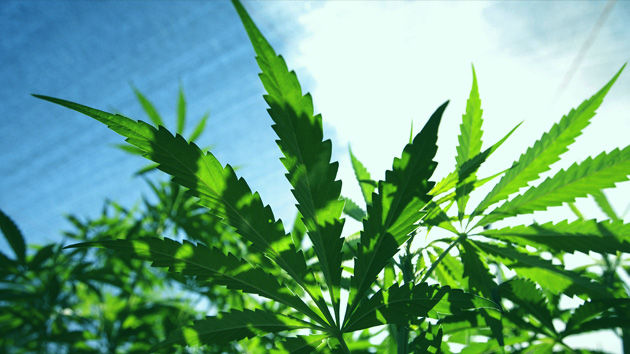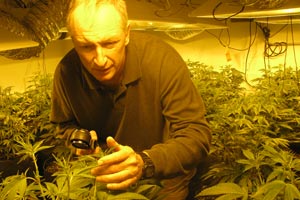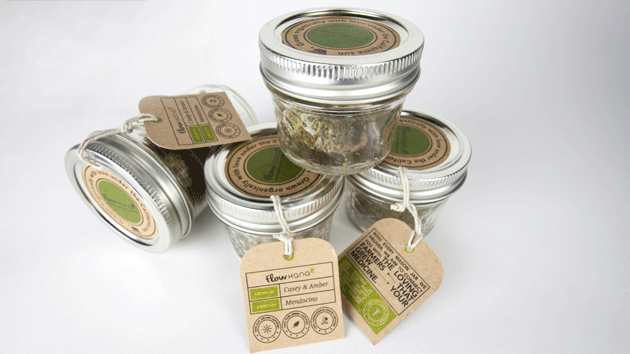
High standards: FlowKana delivers pot from sustainable family farms to your doorstep. FlowKana
“Hello and welcome,” the voice said. “Thank you for joining us on this special evening to learn more about the clean cannabis movement.”
I was in a white van, bouncing up a steep hill to a party at an undisclosed location in Berkeley, California. The voice came from an iPhone held up by one of my hosts, a young woman wearing a cocktail dress and a headband of white flowers. “If you do not wish to participate in the cannabis,” the voice continued, as meditative music played in the background, “do not have anything the flower girls are carrying.”
Duly warned, I was deposited at the front steps of Panoramic Sky, a three-story house designed by a protégé of Frank Lloyd Wright that rents on Airbnb, I later learned, for $2,800 a night. I was wearing a suit I’d bought earlier that day from Neiman Marcus, worried that I didn’t own any clothes nice enough for the occasion. “Dress Code: Formal Attire (Great Gatsby meets California),” the invitation had said. A subsequent update noted that lots of “very important people” would be there.
The occasion was the launch of FlowKana, a sort of Uber and CSA for pot. If you don’t exactly know what that means, don’t worry, neither did I.
Beyond the do-it-yourself s’mores station and a table of gourmet lemonades, I found FlowKana’s founder, Michael Steinmetz Mishkin. He was wearing a black tie and sipping on a glass of water with lime wedges. Techies and investor-types milled around us near the bar, clutching IPAs and glasses of wine. “All the farmers are out there,” Michkin lamented, gesturing toward a balcony where guys in T-shirts were ripping bong hits. “I don’t know why they’ve all separated and isolated themselves.”
Michkin’s PR attaché suggested that it was their natural habitat: “Outdoor!”
FlowKana partners exclusively with outdoor pot farmers from Northern California’s Emerald Triangle region, delivering their harvest straight to consumers via bicycle couriers using an Uber-like smartphone app. Though the Uber-for-pot concept isn’t exactly new, FlowKana’s approach is novel: It’s the only service that sources not from dispensaries, but rather from local, small-scale, “sustainable” outdoor growers—real people whom you can message on Twitter, friend on Facebook, and email through the FlowKana website. It is, effectively, the world’s first community supported agriculture (CSA) system for weed.

“Our ultimate contribution, our ultimate product, is not just going to be an app—though we are good at that,” Mishkin said a few minutes later, in an address to the crowd punctuated by an acrobatics performance by a woman hanging from the rafters. “It’s not just going to be about delivering the absolute best weed in the world, which we have. It’s not going to be about our streamlined, zero carbon or close to zero carbon footprint, from seed all the way to the bicycle couriers who deliver the cannabis to you. Our ultimate product is going to be an organization built on values. Because if we build the right organization with the right values and the right people and the right culture, it will stand the test of time and it will always do remarkable things.”
Maybe it was the contact high, but for a second there, I thought I was in Silicon Valley.
Until very recently, convincing rural pot growers to join a CSA would have been unthinkable. After decades of raids by federal drug agents, California’s original back-to-the-land hippies, their children, and their grandchildren have developed a culture of paranoia. “When I first stated doing this, people were like, ‘Are you stupid?” said third-generation pot farmer Casey O’Neill, the owner of Mendocino County’s Happy Day Farms. He was wearing a T-shirt with his farm’s logo: A smiling sun rising over green hills, giving the world a big thumbs up.
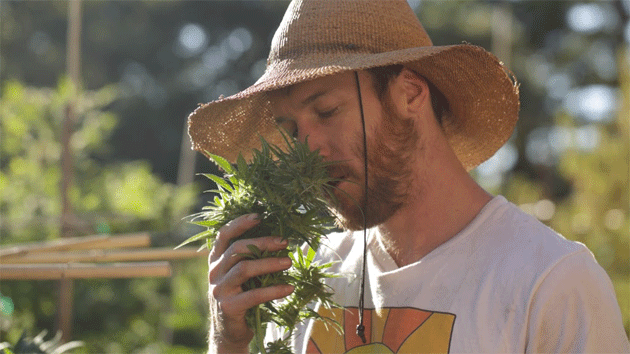
Market forces have left Emerald County pot farmers with little choice but to come out of the shadows. Since 1996, the wholesale price for a pound of Emerald Triangle weed has fallen from around $4,800 to about $1,600 today, driven down by a glut of supply and competition from indoor varieties valued by consumers for their shiny appearance. To compete, O’Neil is aiming to build his own brand, just as top-shelf vintners have done in Napa Valley and organic produce growers have done at farmers markets.
FlowKana benefits farmers like O’Neill by cutting out the middleman. After taking a 25 percent service fee, about a third of what most dispensaries pocket, the app distributes the rest of the proceeds to a farmers association that pays the growers. FlowKana’s smaller take also allows it to price its pot competitively at $50 for an eighth of an ounce—roughly what most high-end dispensaries charge.
More than just marketing tools, pot CSAs may open a path towards a more environmentally friendly cannabis industry. By one estimate, indoor marijuana cultivation accounts for a whopping 9 percent of California’s household electricity use. Meanwhile, outdoor grows in California, many of them done illegally on public lands, consume an estimated 60 million gallons of water a day during the growing season—50 percent more than is used by all the residents of San Francisco. Diversions of streams by Northern California pot growers are now considered the leading threat to the region’s threatened salmon runs.
The farmers who work with FlowKana are different. O’Neil’s farm collects and stores water during the rainy season, generates all of its electricity from solar panels, and is certified by Clean Green, a company that (informally) makes sure pot farms comply with federal organic standards. FlowKana featured the farm in this promotional video:
But the business model has some challenges. FlowKana has to convince customers that its Emerald Triangle weed is worth seeking out. Amid the suits by the bar, I got a primer on hippie pot farming from Mendocino grower Swami Chaitanya, who was sporting a white tunic, white beanie, and chest-length white beard, and carrying a pink woolen shoulder bag decorated with a mandala. “I take my seeds and I put them on the lap of the goddess of cannabis for a moon cycle,” he began. “And I say blessings and mantras. And then when I plant the seeds, I put Ganges water, a drop on each seed.”
“From the Ganges?” I asked.
“From the Ganges.”
“The intention is to make this sacred medicine on the highest level,” he continued. “The plant is so psychosomatic, the vibe you put on it goes all the way right to the end.”
“Oh, absolutely,” interjected pot investor Troy Dayton, touching Chaitanya’s hand. Dayton was wearing a blazer and a Gatsby-esque top hat. “I totally believe that one of the biggest things with cannabis is how suggestible it is. And so the branding actually, I believe, is going to have an impact on peoples’ experience in a big way.”
He should know: His ArcView Group recently held a $2,500-a-ticket marijuana investment conference at San Francisco’s posh Fairmont Hotel. “I think people will get stoned differently if they know it came from you!”
“They do, already!” Chaitanya cut in with a smile. “My brand is Swami Select. It’s a picture of me.”
A few minutes later, near a smorgasbord of loaded bongs, vaporizers, and pre-rolled joints, I ran into Hezekiah Allen, the chair of the Emerald Growers Association, Northern California’s marijuana trade group. He likened the best Emerald Triangle pot to “a $100 bottle of wine,” adding: “I really honestly think that there’s 1 percent of the flower that’s grown in California that is truly the best in the word.”
But beyond the social and environmental benefits, I wondered, what distinguishes the best Emerald Triangle pot?
“Terpenes,” Allen said knowingly. “Terpenes are a thing that one of our farmers should talk to you about.”
After I was introduced to O’Neil, I suggested we discuss them over bong hits.
“You are speaking our language for sure,” O’Neil said, his gravelly voice reflecting, I imagined, years of experience in such matters. He handed me a bong loaded with a strain called Strawberry OG, turned to a grower friend, and said: “He passed the bong-o-rometer.”
“We go to these events all the time and we are the only guys who ever sit on the balcony with a bong,” said the friend, whose farm, Aficionado Seeds, is located on a Mendocino County mountain they’ve nicknamed “Mordor,” for some reason. “If you are about the farmers, you will fucking do a bong load.”
Having partaken, we proceeded to discuss the finer points of marijuana terroir, climate-dependent stem thicknesses and resin levels, and how exposure to the full-spectrum of outdoor sunlight creates a “whole symphony of cannabinoids” in the plant. “It doesn’t have that edge to it,” someone said. “It just seems more balanced—like a warmer feeling, I have noticed.”
I was feeling pretty warm myself. And somehow, much later, I realized we’d totally forgotten to talk about the terpenes.



